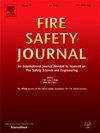工程木材产品燃烧率和消光特性的统计变化
IF 3.4
3区 工程技术
Q2 ENGINEERING, CIVIL
引用次数: 0
摘要
了解木材产品的燃烧速率(质量损失率,MLR)对于确定木材的点火特性、火势大小和熄灭现象至关重要。木材的关键参数(如自灭标准)在文献中均有介绍。这些参数通常是通过试验数量相对较少(例如 n = 3)的台架试验确定的。本研究调查了试验数量对观察到的木材产品关键燃烧率指标(如峰值 MLR、熄灭时 MLR)统计变化的影响。实验使用锥形加热器,在入射热通量分别为 20 kW/m2、40 kW/m2 和 50 kW/m2 的条件下,对 12.7 毫米(0.5 英寸)厚的 ACX 交叉层压胶合板样品进行了 100 次重复试验。在 40 kW/m2 下进行的试验中观察到了明显的变化,这是由于双峰行为造成的,其中 39% 的样品经历了自熄灭,其余 61% 的样品持续燃烧直至烧尽(即材料完全热解)。与在 20 kW/m2 下进行的试验相比,在 40 kW/m2 下进行的试验在熄灭时的 MLR 值几乎增加了一倍,原因是半无限固体条件被打破。这项工作的结果表明,在研究复杂现象时,大量试验具有重要意义。本文章由计算机程序翻译,如有差异,请以英文原文为准。
Statistical variation of the burning rate and extinction characteristics of engineered timber products
Understanding the burning rate (mass loss rate, MLR) of timber products is essential in characterizing the ignition characteristics, fire size, and extinction phenomena experienced by timber. Key parameters for timber, such as self-extinction criteria, are presented throughout literature. These parameters are often determined using bench-scale experiments in relatively low trial quantities (e.g., n = 3). This study investigates the influence of trial quantity on the observed statistical variation in key burning rate metrics for timber products (e.g., peak MLR, MLR at extinction). Experiments were performed using a conical heater to conduct 100 repeat trials at incident heat fluxes of 20 kW/m2, 40 kW/m2, and 50 kW/m2 on 12.7 mm (0.5 in.) thick ACX cross laminated plywood samples. Significant variability was observed in trials conducted at 40 kW/m2 due to bimodal behavior where 39% of samples experienced self-extinction and the remaining 61% of samples sustained combustion until burnout (i.e., complete pyrolysis of the material). The MLR at extinction for the trials at 40 kW/m2 displayed nearly double the magnitude compared to trials conducted at 20 kW/m2 due to the breakdown of the semi-infinite solid condition. The results from this work illustrate the significance of large trial quantities when investigating complex phenomena.
求助全文
通过发布文献求助,成功后即可免费获取论文全文。
去求助
来源期刊

Fire Safety Journal
工程技术-材料科学:综合
CiteScore
5.70
自引率
9.70%
发文量
153
审稿时长
60 days
期刊介绍:
Fire Safety Journal is the leading publication dealing with all aspects of fire safety engineering. Its scope is purposefully wide, as it is deemed important to encourage papers from all sources within this multidisciplinary subject, thus providing a forum for its further development as a distinct engineering discipline. This is an essential step towards gaining a status equal to that enjoyed by the other engineering disciplines.
 求助内容:
求助内容: 应助结果提醒方式:
应助结果提醒方式:


